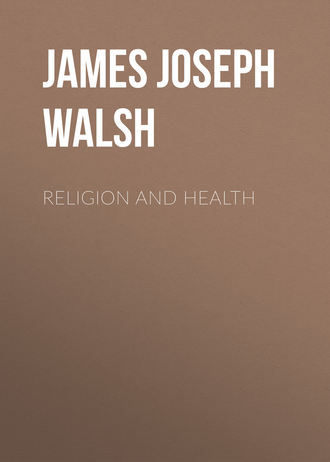 полная версия
полная версияReligion And Health
There are a great many people who seem to forget that air is absolutely the most important requisite for life, and that when it is cold it takes heat away from the animal body and sets all the cell functions working at their best. Human beings are practically heat engines, and we keep on manufacturing heat all the time. As our temperature never rises except when we suffer from fever, some outlet must be found for this heat, and unless there is exposure to the air and especially air in motion that will carry heat away from us, the heat is consumed in various large organs and almost invariably succeeds in making us quite miserable. It is under these circumstances of sluggish indoor living particularly that irritability of all kinds is heightened and that the tendency to lack of self-control is most manifest. It is a form of intoxication actually that comes over people and would remind us not a little of the intoxication that follows from smaller amounts of alcohol with the resultant lack of inhibition.
When people are much out in the air it is surprising what they can stand in the shape of injury without great suffering. Our young soldiers learned during the war that their outdoor life in camps and at the front made the slighter wounds appear almost as nothing to them and even the severer wounds caused them nothing like the pain which they had anticipated or which they actually would have caused if the soldiers continued to be in the same state of mind and body as regards the reaction to pain which had been true during their civilian days. It requires much less courage to be heroic when one has been living the outdoor life and has been hardening muscles by exercise and plain food and not too much sleep than when one is living the indoor, relaxed over-rested life. That does not lessen the merit of what they did, but helps to account for its development in just ordinary mortals and above all helps to explain why now they modestly prefer not to talk about it, for to them it seems to have been just all in the day's work.
Not infrequently oversensitiveness of disposition which resents even the slightest imputation and which is often prone to translate what was a mere conventional remark into a fancied insult is due to lack of sufficient outdoor air to keep the individual in good health. On the other hand men and women who spend a good deal of time outside are capable of standing even severe insults without wincing under them and sometimes this rebounds greatly to the benefit of the cause for which they are working. Father Lockington has dwelt on this in one of his chapters rather interestingly.
"Good health helps us to be patient and silent under insult and wrong, when this makes for duty better done. The souls for whom we labour are often unreasonable, often ungrateful, often crooked, but the trained worker never hesitates. Strong and self-contained he moves serenely on; no display of temper mars his work, no hasty word is uttered, however great the provocation. Like the missionary calmly wiping his face, when spat upon in the Japanese street, or that Little Sister of the Poor, who, struck across the face when begging food for her old people, calmly answered, 'That is for myself, and I deserve it; please now give me something for Christ's poor,' such a worker sees only souls here below, and Christ above, waiting for them. A healthy body will keep the mind broad and even; it has no place for brooding suspicion to lurk; it will help the soul to take a wide view of life and prevent that narrowness of thought, so fatal to work, to which our life of continual introspection tends."
A great many of the vicious impulses in connection with suspicion and jealousy and envy may be traced to a lack of diversion in life. There are some people who take no pains to organize existence in such a way that they have definite diversion at certain times. Every human being ought at some time on every Sunday to decide that on certain days of the following week, and above all on certain evenings, he will do things in which he is particularly interested and which he can look forward to with pleasant anticipation. Those who can should arrange either to go to the theater, or to a lecture in which they are interested, or to visit friends whom they care to see, or to go to a library and look up something that they have been wanting to find out about; or, if it is pleasant weather, to go for a short excursion or a boat ride or something of that kind and they should make two or three appointments with themselves for definite occasions of recreation for the ensuing week. As a rule all that is necessary for this is to make up one's mind to do it, though there is a tendency on the part of a great many people just to let each evening be like every other evening and because of lack of sufficient interest they lose that variety which is the spice of life. As a result existence becomes dreadfully monotonous, and those who live such narrow lives become the subjects of all sorts of unfortunate suggestions with regard to those around them.
Over and over again I have found that when women patients particularly were the subjects of various of these nervous irritabilities so that they were permitting themselves actually to be led into being deluded into various suspicions, there was a prompt disappearance or significant minimization of these thoughts when diversions were properly introduced into their lives. The founders of religious orders were very wise in this matter. In all the religious orders the members are required by rule to spend a certain time in recreation, that is in conversation and lighter occupation, usually several times every day. This must be spent in company with the others and the members of the house are not allowed to absent themselves without good reason. Young religious sometimes feel like resenting the rule requiring them to be present day after day at recreation as if it represented a waste of time, but they learn later on in life how wise it is. The various feast days of the Church are celebrated in such a way that there is a definite diversion from the usual routine of life and then there are special indulgences at table and in the matter of spending time in the open and receiving visitors and other things of that kind which mean a very great deal in breaking the monotony of the religious life.
Very often scruples are, as we have pointed out in the chapter on Nervous Diseases, only a manifestation of a nervous disposition sometimes on a hereditary, but sometimes on an acquired basis. The acquired basis is very often a lack of nutrition due to insufficient food, for people who are underweight are much more subject to dreads and obsessions of all kinds than are those who are up to weight. Living on the will, as it is called, when one is underweight and does not eat very much, certainly not sufficient to supply the energy for what has to be accomplished, is a fruitful source of irritability of any and every kind. It keeps people on edge, that is in a condition of unstable equilibrium, and almost anything that touches them has a tendency to put them into a state of disequilibrium. Bringing people up to normal health and especially up to normal weight is often the best possible means to lessen their tendencies to scruples and to various other manifestations supposed to be spiritual yet which represent only conditions and symptoms that are frequently seen in those who have no religion and no conscientious obligations with regard to anything.
It is surprising how often a sluggish state of the bowels proves to be seriously disturbing to the spiritual life. People find it hard to pray without distraction or to meditate without getting sleepy, and they are liable to think of themselves as perhaps being the object of very special attention on the part of certain evil spirits who make it their business to distract and obtund those who are trying to put themselves in communication with the Most High, when all that is really the matter is that they are absorbing certain materials which ought to be excreted promptly but which are being delayed in their intestinal tract longer than is good for the individual.
I am not one of those who believe that intestinal auto-toxemia is a very serious condition which produces dire results, but I know very well that absorption in any quantity of residual materials from the intestinal tract that were meant to be excreted will produce langour and sluggishness. The present fad among certain physicians for attributing a great many serious symptoms to intestinal auto-intoxication has no basis in physiological chemistry and represents only one of those exaggerations of a minor truth for which medicine is so famous. The idea of self-poisoning, which is all that auto-intoxication means, is a very old one in medicine and the use of drastic purgatives such as calomel in large doses and the antimonial purges and then of blood letting represent the responses to this idea which doctors made in an older time. We know that they did harm and those who would exaggerate the meaning of auto-intoxication in our time are likely to do just as much harm, but there is no doubt at all that obstipation will make the majority of human beings uncomfortable and take away their initiative and keep them from being up to their best in mental and spiritual matters. To use some of the greatly advertised remedies or modes of treatment which are suggested for it, however, would probably do more harm than good. There are a number of simple sensible methods of treatment by which the affection may be overcome. Above all the formation of good habits, of taking an abundance of water, of eating coarse food, the peelings of baked potatoes and the parings of baked apples and an occasional orange with its peel, and using marmalade rather freely as well as eating whole wheat bread will gradually overcome the condition. The important thing is not to mistake the merely physical affection for a spiritual disturbance.
It requires persistence to form good habits and it is ever so much easier just to take something that will supposedly do the same good work "while you sleep" and are not bothered by the exertion of the will power necessary to form the habits that are required. Many a disturbance of health is due to sloth and laziness rather than to ignorance of what ought to be done or to any inherent tendency to ill in the body. Any number of people blame Providence for ills which they have brought on themselves by neglect of their own health and the habits necessary to maintain it.
Nothing so conduces to good health as the regularity of life without haste and without worry which the rational practice of religion brings in its train. The attitude of mind that a trusting faith in the Almighty fosters is particularly likely to prevent the neurotic symptoms and exaggerations of feelings which are responsible for so much of the modern suffering of mankind. It makes the real pains and aches ever so much more bearable and eliminates those which to a great extent are imaginary. The success of all sorts of curious therapeutic systems which prove after a time to be utterly without beneficial effect on the human body shows how much faith in anything may mean for health and restoration to health, even in the midst of what is supposed to be rather serious illness, and as men are bound to have faith in something and a living faith in a Providence that somehow, even though we may not be able to understand it, cares for men, drawing good even out of evil, can accomplish an immense amount in making men less amenable to suffering even in this world. It would be too bad to reduce religion merely to this status, but this should be one of its benefits. As the Scriptures said, "For it is not a vain thing for you because it is your life, and through this thing you shall prolong your days in the land."
1
"Agnosticism," Scribners, New York, 1895.
2
I owe this and a number of other quotations in this chapter to Tabrum "Religious Beliefs of Scientists," London, 1911.
3
Let nothing disturb thee, Let nothing affright thee, All things are passing, God never changeth. Who God possesseth In nothing is wanting. Alone God sufficeth. (Longfellow translation.)4
Dr. Karl Pearson, of London, the well-known authority on eugenics, has investigated rather carefully the health of children in large and small families, and has demonstrated that children are healthiest when there are five to eight children in the family. On the average, first and second children are not as healthy as those who come later in the family, and those who are in the best condition physically and mentally for life come after the fourth. The early children in the family are more liable to epilepsy and certain serious nervous diseases, and are often of unstable nervous equilibrium, while the later children are more gifted and are likely to live longer.
5
There are probably several hundred thousand men in this country who have to work on Sunday because the tobacco stores are open. This is an abuse corresponding to that with regard to the saloon, which will almost surely bring about a reaction in the public mind against the traffic in tobacco generally.
6
Methuen, London, 1911.
7
Black. 1920.
8
Appleton.
9
"Memories and Studies", New York, 1911.
10
Macmillan, New York, 1918.
11
Series 23, Vol. IV.
12
Series 11, Vol. II.
13
Popular Science Monthly , April, 1901.
14
D. Appleton & Co., New York, 1912.
15
McClure's Magazine , June, 1908.
16
Boston, 1914.
17
London, 1903.
18
The suggestion for this chapter came from Reverend William J. Lockington's little book on "Bodily Health and Spiritual Vigour", Longmans, Green and Co., London, New York, Bombay and Calcutta, 1914.









